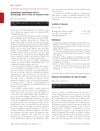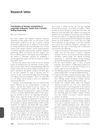 4 citations,
July 2017 in “British Journal of Dermatology”
4 citations,
July 2017 in “British Journal of Dermatology” The study identified the top 10 most important areas for future hair loss research.
 February 2018 in “British Journal of Dermatology”
February 2018 in “British Journal of Dermatology” We need better research to improve alopecia treatment and patient care.
 July 2017 in “British Journal of Dermatology”
July 2017 in “British Journal of Dermatology” The document concludes that scalp conditions have various causes and can present in many different ways.
 6 citations,
October 2020 in “Journal of Cellular and Molecular Medicine”
6 citations,
October 2020 in “Journal of Cellular and Molecular Medicine” 3D culture helps maintain hair growth cells better than 2D culture and identifies key genes for potential hair loss treatments.
 July 2018 in “British Journal of Dermatology”
July 2018 in “British Journal of Dermatology” Hair regrowth was seen in 83% of children with alopecia, immune system plays a role in the condition, and various treatments showed effectiveness for hair and nail disorders.
 5 citations,
August 2015 in “British journal of dermatology/British journal of dermatology, Supplement”
5 citations,
August 2015 in “British journal of dermatology/British journal of dermatology, Supplement” The top research priorities for congenital ichthyosis include long-term side effects of oral retinoids, best topical treatments, and treatments for itch and hair loss.
 10 citations,
June 2017 in “Experimental Dermatology”
10 citations,
June 2017 in “Experimental Dermatology” New hair loss treatments have evolved from understanding hair biology and patient needs.
 69 citations,
April 2017 in “BMJ open”
69 citations,
April 2017 in “BMJ open” Many people with alopecia experience high levels of social anxiety, anxiety, and depression, and while wigs can boost confidence, they may also cause anxiety.
 1 citations,
September 2020 in “Cochrane library (CD-ROM)”
1 citations,
September 2020 in “Cochrane library (CD-ROM)” The analysis aims to identify the most effective and safest treatments for alopecia areata.
 41 citations,
September 2018 in “Australasian journal of dermatology”
41 citations,
September 2018 in “Australasian journal of dermatology” No systemic treatment for alopecia areata has strong evidence of effectiveness.
 66 citations,
June 2018 in “British Journal of Dermatology”
66 citations,
June 2018 in “British Journal of Dermatology” European guidelines recommend regular eye and ear exams, skin care, vitamin D supplements, and cautious use of medications for managing congenital ichthyoses.
 2 citations,
December 2023 in “Health Technology Assessment”
2 citations,
December 2023 in “Health Technology Assessment” Laser treatment and deroofing are effective options for hidradenitis suppurativa.
 January 2009 in “Springer eBooks”
January 2009 in “Springer eBooks” The document concludes that treating skin conditions should include psychological care and a multidisciplinary approach is essential for effective management.
 6 citations,
August 2023 in “Fertility and Sterility”
6 citations,
August 2023 in “Fertility and Sterility” The 2023 guideline for PCOS suggests using updated diagnostic criteria, assessing related health risks, and recommends lifestyle changes and specific treatments for symptoms and fertility issues.
 October 2023 in “Skin health and disease”
October 2023 in “Skin health and disease” Alopecia areata costs individuals about 3% of their income, with women, Asians, those with lower income, and more severe symptoms spending more.
 December 2017 in “The journal of investigative dermatology. Symposium proceedings/The Journal of investigative dermatology symposium proceedings”
December 2017 in “The journal of investigative dermatology. Symposium proceedings/The Journal of investigative dermatology symposium proceedings” The summit aimed to speed up finding treatments for alopecia areata.
 6 citations,
August 2023 in “European journal of endocrinology”
6 citations,
August 2023 in “European journal of endocrinology” The 2023 guideline advises a detailed approach for PCOS, focusing on early detection, lifestyle and medical treatments, and managing health risks.
 1 citations,
May 2014 in “Lipid Technology”
1 citations,
May 2014 in “Lipid Technology” New cleaning surfactants, biofuel production plans, dairy expansions, improved lipid testing methods, and various product launches and developments were reported in lipid technology.
 September 2021 in “Physiology News”
September 2021 in “Physiology News” Addressing underrepresentation in Parkinson's research is crucial for better treatments and understanding.
 September 2021 in “Physiology News”
September 2021 in “Physiology News” Air Vice-Marshal Sir Ralph Jackson significantly advanced dialysis technology in the UK.
November 2016 in “Regenerative Medicine” In September 2016, there were major advancements and promising clinical trials in stem cell research and regenerative medicine.
 1 citations,
January 2020 in “Elsevier eBooks”
1 citations,
January 2020 in “Elsevier eBooks” Forensic medicine is crucial for justice and needs continuous innovation and technology integration.
 2 citations,
July 2023 in “Frontiers in Endocrinology”
2 citations,
July 2023 in “Frontiers in Endocrinology” The review found that current care models for PCOS are not fully effective and more research is needed, especially in low-income countries.
 January 2022 in “Sustainable development goals series”
January 2022 in “Sustainable development goals series” The document concludes that significant investment in agricultural innovation is necessary to achieve global food security and nutrition.
 October 2023 in “Journal of Preventive Diagnostic and Treatment Strategies in Medicine”
October 2023 in “Journal of Preventive Diagnostic and Treatment Strategies in Medicine” Low ferritin and Vitamin D levels may cause hair loss after COVID-19.
 108 citations,
November 2006 in “The Milbank Quarterly”
108 citations,
November 2006 in “The Milbank Quarterly” Drug advertising has greatly increased, changing consumer behavior and raising concerns about its influence on healthcare and patient protection.
 1 citations,
February 2022 in “Journal of the American Academy of Dermatology”
1 citations,
February 2022 in “Journal of the American Academy of Dermatology” The document concludes that improving patient safety and quality is increasingly important in dermatology.
 11 citations,
March 2021 in “Dermatology and therapy”
11 citations,
March 2021 in “Dermatology and therapy” Researchers created a new tool to measure the effects of alopecia areata from the patient's view, focusing on hair loss, daily life, and emotional health.
 97 citations,
October 2019 in “Journal of Translational Medicine”
97 citations,
October 2019 in “Journal of Translational Medicine” A very low-calorie ketogenic diet is effective for quick weight loss and improving health in obese patients, with careful management of side effects and maintenance.
 July 2024 in “Deleted Journal”
July 2024 in “Deleted Journal” The Ayurvedic program effectively manages hair loss due to iron deficiency anemia.




























